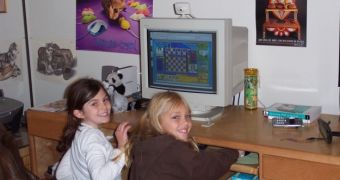Yet another study concerning video games' influence on youngsters these days. Boring right? Not quite. Although it argues the same burning issues we've come to read every week or so (children are illiterate because of games, develop anti-social behavior and so on) this time the situation may be more serious. According to educational psychologist Jane Healy, children under seven should not be allowed to play computer games as it may damage their attention span.
The study researchers conducted with Healy aboard examined more than 300 products, "including computer games, toys, virtual games for children and learning programmes to be run on home computers," as nowpublic.com reports. What they found was that there are too many children left sitting isolated in front of a screen these days.
The rapid pace of computer games is only stimulating basic "fight or flight" sections of the brain: "If you watch kids on a computer, most of them are just hitting keys or moving the mouse as fast as they can. It really reminds me of rats running in a maze," Healy said.
Parts responsible for higher reasoning, as Jane implies, are then put to little use. Thus, as children's brains are developing differently nowadays, "games can be linked to a rise in the diagnosis of attention-deficit disorder in children," according to the same report.
It was a seminar at the Consumer Electronics Show in Las Vegas where Jane revealed the study results, drawing the line at age seven for children picking up on computer games. Healy reckons that it is only after age 7 that children's brains have had time to develop.
Also, Joan Ganz Cooney Centre researchers aim to investigate links between new technology and learning. One of their observations is that the average age that children in The States had begun to use gadgets has come down from just over eight to just over six and a half since 2005.

 14 DAY TRIAL //
14 DAY TRIAL //